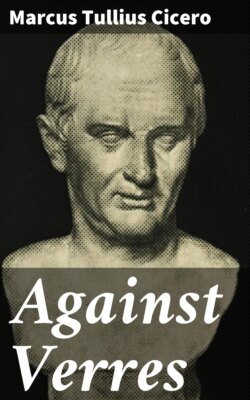Читать книгу Against Verres - Marcus Tullius Cicero - Страница 52
На сайте Литреса книга снята с продажи.
30
ОглавлениеTable of Contents
75Why need I now speak of the energy of Cnaeus Dolabella at the second hearing of the cause,--of his tears of his agitation of body and minds? Why need I describe the mind of Caius Nero,—a most virtuous and innocent man, but still on some occasions too timid and low spirited?—who in that emergency had no idea what to do, unless, perchance (as every one wished him to do), to settle the matter without the intervention of Verres and Dolabella. Whatever had been done without their intervention all men would approve; but, as it was, the sentence which was given was thought not to have been pronounced judicially by Nero, but to have been extorted by Dolabella. For Philodamus and his son are convicted by a few votes: Dolabella is present; urges and presses Nero to have them executed as speedily as possible, in order that as few as may be may bear of that man's nefarious wickedness. 76There is exhibited in the market-place of Laodicea a spectacle bitter, and miserable, and grievous to the whole province of Asia--an aged parent led forth to punishment, and on the other side a son; the one because he had defended the chastity of his children, the other because he had defended the life of his father and the fair fame of his sister. Each was weeping,—the father, not for his own execution, but for that of his son; the son for that of his father. How many tears do you think that Nero himself sheds? How great do you think was the weeping of all Asia? How great the groans and lamentations of the citizens of Lampsacus, that innocent men, nobles, allies and friends of the Roman people, should be put to death by public execution, on account of the unprecedented wickedness and impious desires of one most profligate man? 77After this, O Dolabella, no one can pity either you or your children, whom you have left miserable, in beggary and solitude. Was Verres so dear to you, that you should wish the disappointment of his lust to be expiated by the blood of innocent men? Did you leave your army and the enemy, in order by your own power and cruelty to diminish the dangers of that most wicked man? For, had you expected him to be an everlasting friend to you, because you had appointed him to act as your quaestor? Did you not know, that Cnaeus Carbo, the consul whose real quaestor he had been, had not only been deserted by him, but had also been deprived of his resources and his money, and nefariously attacked and betrayed by him? Therefore, you too experienced his perfidy when he joined your enemies,—when he, himself a most guilty man, gave most damaging evidence against you—when he refused to give in his accounts to the treasury unless you were condemned.[9]
